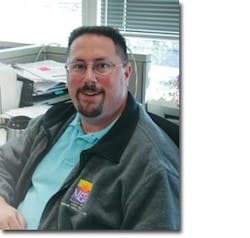Industry Jack of all Trades
Q: How did you get involved in the industry?
A: I began my airline career with America West Airlines back in 1993. I started on the ramp in EWR as a temp. I worked all through college with HP at EWR until 2000 when I decided to make it my full-time career. I accepted the position of passenger service supervisor with America West in October of 2000. By July of 2001 I had been offered a position as the policies and procedures senior analyst-cargo operations in Phoenix. In the aftermath of 9/11 I was laid off with 250 other managers. I flew as a flight attendant for about a year then grounded myself as a rental car agent and operations equipment manager. In 2005, the former ground support equipment manager for Mesa Airlines recruited me to take over GSE for all of Mesa Airlines. In April of that year I accepted the position and I have been the GSE manager at Mesa for more than two years now.
Q: What are some of the major trends you have seen developing over the past decade?
A: Everyone seems to be looking towards bigger and bigger aircraft. That means bigger push backs, adding belt loaders, bag tractors and carts to support the increased loads and bigger GPUs and air starts to support the larger aircraft’s needs. All of it points to the GSE Manager who must negotiate for and acquire new/used equipment to support the new fleet. Usually this new GSE is not common to what is currently in use, so training, parts stores and mishaps all become a part of the growing pains. Time to adjust is needed and unfortunately in the airline industry, time is of the essence.
Q: What are some of the biggest challenges you have faced over the years?
A: One of the biggest challenges I face is doing more with less. In the post 9/11 airline world, the belts are tightened. Parts are up, labor is up, steel is up...GSE costs are significantly more than they were just a few years prior. Another big challenge is turnover. Every airline faces this When new agents are brought on board it takes time to learn the GSE and how it should be treated. All of this takes time and money. Balancing these factors while remaining on budget is a challenge.
Q: What do you favor most about working in this industry?
A: Most definitely the people. I enjoy working with others in the GSE field for cost effective solutions, helping people out or getting the help I really need. We’re all in the same boat, one way or another. It is nice to be able to call one of my counterparts at another airline for advice or vendor contacts. I enjoy being that person that some will call for the same advice. There are a lot of vendors and they’re there to help. Finding the right ones who are willing to work with you makes all the difference. When you set yourself up with the right people the job can be fun. I enjoy coming to work every day at Mesa. Sure, every day is an adventure, but the people in the GSE field make it all worth while.
Q: What advice would you give to those new to the industry?
A: To those new to the industry I would say to pick up the phone, get on a plane and talk with people face to face. Know your vendors, your people, your mechanics and your peers. Show them that GSE is important to you. Let them know that you are there to support them. If people see you’re looking out for them and their GSE, they will help you, support you, and make you a success!
Q: What in the industry keeps you up at night?
A: The phase-out of older GSE systems and parts. Frequently we will take a bag tractor or GPU that has long out-lived its life expectancy and place it in an out-station with two or three flights a day. There it can live many more years due to the reduced demand on it. Lately it has become more and more difficult to source parts for these older units that, if not for a starter or wheel hub, would already be back in operation.
Q: If not in GSE where would you be?
A: If I was not in GSE I would most likely be on the east coast, maybe back in the IT support or call center industry. The Mesa GSE manager’s position came along at the right point in my life and I am very thankful for the opportunities I’ve had.
